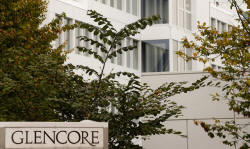|
Fake receipts at Glencore
warehouse unit triggered sector credit freeze, Qingdao
shivers: sources
 Send a link to a friend
Send a link to a friend
 [February 13, 2017]
By Melanie Burton [February 13, 2017]
By Melanie Burton
MELBOURNE
(Reuters) - Some global banks briefly froze credit lines for Singapore
metal traders last month after a unit of commodities giant Glencore
uncovered fake warehousing receipts, people familiar with the matter
said, reviving the specter of a $3 billion scandal that rocked the
trading world three years ago.
Though the impact has proved limited so far, the "forged" receipts for
nickel stocks that Glencore's Access World unit said it found still set
alarm bells ringing - even though regulation and scrutiny have been
tightened across the business since the 2014 Qingdao port scandal in
China.
Two people who have metal storage dealings with Access World said the
company told them the receipts were from a third party, not issued
internally. At Qingdao, a firm allegedly duplicated notes pledging metal
as collateral for multiple bank loans.
"We checked with (Access World) and all our stock was in good order,"
said one of the people, an official at a Singapore trading house. But
the firm did have its credit lines temporarily frozen by several banks
while they investigated, the person said, speaking on condition of
anonymity.

Metals traders told Reuters that a raft of international banks involved
in providing finance to the sector, including Australia's ANZ, France's
Natixis and Rabobank of the Netherlands, temporarily froze some credit
lines before for the most part resuming business.
Natixis declined to comment. Rabobank said it was aware of the news on
forged warehouse certificates circulating in the name of Access World,
and was "assessing the situation," but could not comment further.
ANZ said that its "warehouse commodity financing was a small business
within (the bank's) institutional division with only a handful of
customers", and declined to comment further.
In its statement disclosing the incident, Access World said it had
become aware of "forged warehouse receipts" and urged holders of its
warehouse receipts to authenticate them. Last week it said it would
provide authentication for clients' certificates on Feb. 10-15, after
which it would honor "duly authenticated original warehouse receipts".
The warehouse receipts concerned applied to stockpiles in Singapore,
people said. Reuters was unable to confirm the volumes involved, nor
whether finance had been advanced against them, or which, if any other
locations were affected.
Glencore itself declined to comment.
[to top of second column] |

The logo of commodities trader Glencore is pictured in front of the
company's headquarters in Baar, Switzerland, September 30, 2015.
REUTERS/Arnd Wiegmann/File Photo

FROM GREEN TO AMBER
The late January disclosure led to a frenzy of phone calls among trading
houses and banks - and the cancellation of holidays over the Lunar New
Year period - as warehousers combed through their stock to make sure all
was in order.
"There's a lot of 'calm panic' out there," said an executive at another
trading company in Singapore, speaking on condition of anonymity. At the
time the news broke, he said, people were asking, "(What if) It's
internal fraud at a warehouse company?"
But the fallout appears to have been limited, partly because the type of
alleged fraud attempted was via a third party. "It's not systemic like
the one in Qingdao," said one banker familiar with the matter, who
declined to be identified because he wasn't authorized to discuss the
matter.
Banks and trading houses have tightened procedures around collateral
financing since Qingdao, particularly around limiting transfers of
titles to metal.
The London Metal Exchange - the largest base metals exchange - set up a
global inventory monitoring chain known as LMEShield for private stocks
held outside its warehousing network, where rent is cheaper, but
security is also lower.
Tighter scrutiny notwithstanding, the January incident left the metals
trading business on edge and, for some, on hold.
"Our first reaction was, 'Not another one! This isn't China, it's
Singapore and (Malaysia's) Johor'," said an official at one Western Bank
active in financing metal, who declined to be identified.

"We were on green, we are now on amber. Until we know exactly what
happened and how was it done, we wouldn't be financing this name (Access
World)," said the banker, who warehouses his metal with a competitor.
(Reporting by Melanie Burton; Editing by Kenneth Maxwell)
[© 2017 Thomson Reuters. All rights
reserved.] Copyright 2017 Reuters. All rights reserved. This material may not be published,
broadcast, rewritten or redistributed. |